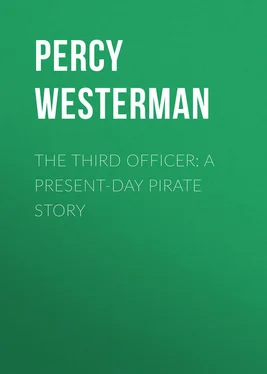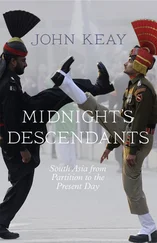Percy Westerman - The Third Officer - A Present-day Pirate Story
Здесь есть возможность читать онлайн «Percy Westerman - The Third Officer - A Present-day Pirate Story» — ознакомительный отрывок электронной книги совершенно бесплатно, а после прочтения отрывка купить полную версию. В некоторых случаях можно слушать аудио, скачать через торрент в формате fb2 и присутствует краткое содержание. Жанр: foreign_prose, на английском языке. Описание произведения, (предисловие) а так же отзывы посетителей доступны на портале библиотеки ЛибКат.
- Название:The Third Officer: A Present-day Pirate Story
- Автор:
- Жанр:
- Год:неизвестен
- ISBN:нет данных
- Рейтинг книги:5 / 5. Голосов: 1
-
Избранное:Добавить в избранное
- Отзывы:
-
Ваша оценка:
- 100
- 1
- 2
- 3
- 4
- 5
The Third Officer: A Present-day Pirate Story: краткое содержание, описание и аннотация
Предлагаем к чтению аннотацию, описание, краткое содержание или предисловие (зависит от того, что написал сам автор книги «The Third Officer: A Present-day Pirate Story»). Если вы не нашли необходимую информацию о книге — напишите в комментариях, мы постараемся отыскать её.
The Third Officer: A Present-day Pirate Story — читать онлайн ознакомительный отрывок
Ниже представлен текст книги, разбитый по страницам. Система сохранения места последней прочитанной страницы, позволяет с удобством читать онлайн бесплатно книгу «The Third Officer: A Present-day Pirate Story», без необходимости каждый раз заново искать на чём Вы остановились. Поставьте закладку, и сможете в любой момент перейти на страницу, на которой закончили чтение.
Интервал:
Закладка:
It was Fritz Strogoff who engineered most of the latter's enterprises. He was the brains of the pirate organization, and while up to the present he was content to let Porfirio take precedence, he was merely awaiting a favourable opportunity of cutting his connection with the Malfilio , taking with him considerably more than the agreed share of the ill-gotten booty. He did not believe in playing too long with Fate.
Ramon Porfirio was literally the tool of his second lieutenant, although, with the arrogance of a Spaniard with a decided dash of Indian blood, he failed utterly to recognize Strogoff's influence. Of an imaginative, reckless, and hot-tempered disposition, he firmly believed that he was a leader of men, and a worthy successor to Morgan, Mansfield, and other famous buccaneers.
Beginning his career as a small public official at Lima, Porfirio soon found that existence was far too tame. He absconded, taking 20,000 dollars of public money, and found a temporary refuge in Chile. At Talcahuano he came in touch with German agents, who were at that time busily engaged in picking up news in order to keep von Spee informed of the movements of Craddock's squadron. At that time there was hardly such a thing as British propaganda, and Porfirio, through his German associates, was well primed with utterly erroneous ideas of the might of Britain's sea-power.
It was to the Huns at Talcahuano that he owed the thought of becoming a sea-corsair, and preying upon unprotected British shipping. The idea grew and took tangible form. After acquiring a smattering of the arts of seamanship and navigation, he felt confident enough to embark upon his career of piracy, but the difficulty was to find a vessel suitable to his pocket and his needs.
About this time he met Strogoff. Hinting at his ambition and his difficulties, Porfirio found, as he thought, a kindred spirit. Strogoff suggested that the Kamtchatkan port of Petropavlovsk would furnish the necessary vessel. It was about that time that Siberia succumbed to Bolshevism, and several Russian light cruisers and gunboats were lying at Petropavlovsk. Since it was hopeless for them to return either to the Black Sea or the Gulf of Finland, it was more than likely that an armed vessel might be acquired at a reasonable price.
Incidentally Strogoff mentioned that he knew of a secret naval base, situated in a remote island in the North Pacific. It had been prepared some years before the Great War for the use of the German squadron stationed in these waters, so that when "der Tag" dawned the Hun commerce-destroyers would have a base to operate from should Kiao-Chau prove useless – as it quickly did – to the squadron.
Fortunately, owing to the total destruction of von Spee's ships, and the transference of the Emden's and Königsburg's activities to the Indian Ocean, the secret base was not brought into operation. The garrison of German marines "stuck it" for nearly a twelvemonth in total ignorance of what was going on in the outside world. At length they abandoned the island, sailing, it was assumed, in a small vessel attached to the base. But no one in Germany or elsewhere ever heard more of the lost garrison, and the fate of that handful of Hun marines remains an unsolved mystery.
Enlisting the services of Pablo Henriques, master of a Chilian trading schooner, Porfirio and Strogoff, accompanied by a nucleus of half-castes of doubtful character, arrived at Petropavlovsk a few weeks before the port was due to be come icebound. Under hatches they carried six casks of wine, a quantity of woollen blankets, and two thousand dollars in gold. Before they reached the Kamtchatkan coast the cargo was augmented by booty forcibly removed from a couple of Kanaka-manned traders. The Kanakas were easily persuaded to become members of the pirate band.
The acquisition of the light cruiser Zarizyno was accomplished so easily that even Strogoff opened his eyes in astonishment. A Bolshevik official, Lipski by name, readily agreed to hand over the ship in exchange for the wine, blankets, and half the gold. He, too, had an eye for the main chance, and had no great faith in the stability of the Soviet Government. Moscow and Petrograd were thousands of miles away. Before Lenin and Trotsky could demand an account of his stewardship, Lipski would also be miles away, with his nest well feathered, to seek an asylum in Chicago, in the vast Slavonic family domiciled under the protection of the Stars and Stripes.
Augmenting their numbers by the enlistment of Chinese and Malay seamen, together with a handful of Slav desperadoes otherwise marooned in Petropavlovsk, Porfirio and his two lieutenants took the Zarizyno to sea. Slightly disguised by means of different funnel-markings, and given the name of Malfilio , she was taken to the secret base, where her active career as a pirate began.
On the island they found an abundance of Welsh steam-coal, tinned provisions, clothing, quick-firing guns, machine-guns, and rifles, with a large quantity of suitable ammunition in fair condition.
At first Porfirio was content to confine his activities to the capture of small trading vessels plying between Hawaii and the archipelagoes south of the line; then, becoming bolder, he directed his attention to bigger game.
The Kittiwake , his first big prize, was a comparatively easy capture. She furnished him mainly with flour consigned for Japan, where quite recently a large demand for wheat had arisen in place of rice, this demand being one of the causes of the shortage of flour in Europe.
The Kittiwake was taken without loss of life. Porfirio had rather shrunk from murder, owing to a mistaken idea on his part, communicated by his German friends at Talcahuano, that piracy without murder was not a hanging matter. Ramon had a strong objection to a hempen rope.
But with the capture of the Alvarado , which yielded a richer booty, his record for milk-and-water piracy ended. Nor did he know that the prize was a Yankee until he was in possession of her, and fifteen corpses lay in her scuppers.
Having crossed the Rubicon, he was less scrupulous in his methods, but he refrained from taking life except in actual fight, or for disregard of his orders on the part of his prisoners. To impress upon the survivors of the Donibristle his views on the subject, he had caused them to be formed up in a hollow square on the beach of the secret base.
Ramon Porfirio's knowledge of English being, to say the least, imperfect, he called upon Black Strogoff to address the assembly. This the Russian proceeded to do, his speech including a number of words and sentences of an academic nature interspersed with the vernacular of Wapping.
He informed the Donibristle's crew that they would be well treated if they behaved, and dealt with severely if they did not. They would have to work under their own officers. Failure to perform their allotted tasks would be punished by reduction of rations, solitary confinement, and in exceptional cases by death.
He also mentioned in an off-hand kind of way that there were vacancies in the crew of the Malfilio , vacancies which offered a life that would appeal to the adventurous, with prospects of becoming rich in a very short space of time. He did not propose to ask for volunteers at that moment (he knew that none would be forthcoming, although it was possible that later on some of the Donibristle's crew would secretly hand in their names) but he would be willing to consider applications in due course.
The men heard his appeal in stolid silence. The offer fell on deaf ears. They were "not having any". Ramon Porfirio would have to cast his net elsewhere to obtain his recruits.
CHAPTER VIII
The Compound
At the conclusion of the pirate lieutenant's speech silence fell upon the close ranks of the prisoners. Porfirio conferred with his subordinates for some moments, then, turning abruptly, walked down to the Malfilio's boat. Henriques accompanied him; but Strogoff, who had been told off to remain as a sort of deputy-governor of the island, stood in the centre of the hollow square, his dark eyes closely scrutinizing the faces of his captives.
Читать дальшеИнтервал:
Закладка:
Похожие книги на «The Third Officer: A Present-day Pirate Story»
Представляем Вашему вниманию похожие книги на «The Third Officer: A Present-day Pirate Story» списком для выбора. Мы отобрали схожую по названию и смыслу литературу в надежде предоставить читателям больше вариантов отыскать новые, интересные, ещё непрочитанные произведения.
Обсуждение, отзывы о книге «The Third Officer: A Present-day Pirate Story» и просто собственные мнения читателей. Оставьте ваши комментарии, напишите, что Вы думаете о произведении, его смысле или главных героях. Укажите что конкретно понравилось, а что нет, и почему Вы так считаете.












